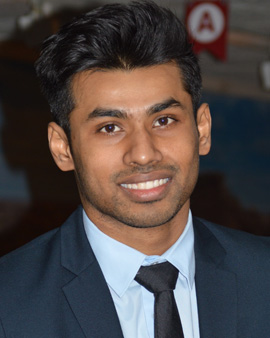
Background
Hometown: New York, New York
Undergraduate: City University of New York, BS in Biology and Psychology
Graduate: Drexel University College of Medicine, MS in Medical Science
Q&A
Can you tell me a little about yourself before you came to Drexel?
I'm originally from New York. I graduated from the City University of New York in 2015. After that, I took a year off to work as a clinical research coordinator, and then I applied to Drexel's Interdepartmental Medical Science (IMS) program. I started that in 2016, and while I was completing the program, I decided to transfer into the Master's in Medical Science (MMS) program, which is a two-year program. That way, I could have experience with academics in the first year and research in the second year. That's pretty much what I've been doing for the last two years. Other than that, I enjoy playing sports. I play a lot of basketball and soccer, and I do programming and coding as a hobby.
What was it about Drexel's Interdepartmental Medical Science program that was attractive to you?
I liked the Interdepartmental Medical Science program because you take first-year medical school courses, so you get to see what the curriculum at medical school is like. You get exposed to the intensity and the workload of medical school while you're in a graduate program. It better prepares you and your application for entry into medical school. It's also appealing because it is only one-year long. I figured I could do this, boost up my application, and then apply to medical school.
But then you decided to transfer to the Master's in Medical Science program?
When I was going over the medical school application process and considering what medical schools like to see on applications, I realized one gap in my application was research. I had a lot of clinical research, but I didn't have much lab, or basic science research. That's what the Master's in Medical Science affords you. Your research may also lead to publications. I figured this would be beneficial, and it worked out. I have been accepted to a medical school already and am interviewing at another one soon.
Can you tell me, what has your experience been like at Drexel as far as working with the faculty and getting to know your classmates?
You really get to know your classmates, especially in the first year because everybody is taking the same courses. Everybody was in the trenches together, so you got to know each other pretty well. There would be days where everyone is studying hard, and then there would be days where people were relaxing, so you'd have that balance.
The faculty have been great. They are very involved, very helpful, and advocate on your behalf when applying to medical school.
Can you tell me a little bit about the research project that you are doing?
I'm working with Dr. Ramesh Raghupathi's lab at the Queen Lane campus where we're researching traumatic brain injury (TBI). My research project focuses on the differences between male and female animal models exposed to repetitive, mild traumatic brain injury, looking at what kind of differences exist in the injury deficits, as well as what beneficial effects exercise may have on TBI. Currently, the most common treatment for mild traumatic brain injury is rest and relaxation—physical and mental rest—but recent research has shown that exercise is a good therapeutic option for recovery, and it helps to mitigate some of the deficits associated with traumatic brain injury.
What makes this research exciting?
There's approximately two million cases of TBI reported each year. The number of unreported cases is high as well, so this research has a very real application in the real world. I'm really interested in neuroplasticity and neurogenesis. Exercise has been shown to increase neurogenesis, improve memory, and help people recover after certain injuries, so being able to look at the molecular mechanisms and the functional outcomes of exercise is really exciting.
Do you think that you'll focus on neuroscience in medical school?
Yes, absolutely. My undergraduate school didn't offer a neuroscience degree, so I majored in biology and psychology, which allowed me to tailor my education to neuroscience. I've pretty much been studying neuroscience since undergrad and would like to continue to do so in medical school.
What advice would you give someone who is considering applying to the Drexel Master's in Medical Science program?
If you are applying to Interdepartmental Medical Science, I would say be ready for the coursework because it can hit you all at once. If you're not prepared for it, you can fall behind. However, there is a great student body, and your classmates will definitely support you. There are a lot of resources, including advisors and tutors, available.
If you are applying to the Master's in Medical Science program, make sure you want to do research, because that is a very large portion of your curriculum. You spend a quite a bit of time in the lab. Overall, it's a great experience and it definitely helps you if you plan to go to a professional school, not only a medical school but pharmacy school, veterinary school, or other professional school. One of my friends from the program is applying to physical therapy school, so the degree can lead to quite a few avenues.